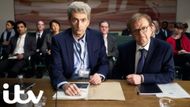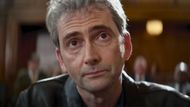The Hack is a new British true-crime series that dropped all at once on ITVX on September 24, 2025. While all seven parts were made available on the same date, a TV broadcast was also rolled out weekly on ITV1 and STV, starting from the same day and stretching out till November 5, 2025.
The series digs into the News International phone hacking scandal. It is set between 2002 and 2012, mashing two real-life threads: On one side, you have investigations led by journalist Nick Davies (played by David Tennant), who is set on blowing the lid off the News of the World hacking scandal. And then, running parallel, there is the police chase to finally solve the 1987 murder of private investigator Daniel Morgan, led by ex-Met Police boss Dave Cook (played by Robert Carlyle).
The series follows the trail between these two cases, examining issues of abuse of power, corruption, and media impropriety. It captures the dark illegality in the News of the World and the decline in confidence in the traditional media as a result of these scandals. It is a real-life story with other main characters, including former editor of The Guardian, Alan Rusbridger, played by Toby Jones.
The series blends fictionalized segments with actual footage, capturing the nuance and individual drives involved in the pursuits by the principal characters in the investigation.
The Hack ending explained

In the opening episode of The Hack, investigative reporter Nick Davies gets a cryptic tip in 2008 that News of the World was involved in phone hacking on a large scale. He finds that it was not the act of a single wayward reporter but a systemic activity. His editor, Alan Rusbridger, believes in him despite the perils involved and instigates a David versus Goliath battle against a powerful media behemoth.
At the same time, a detective chief superintendent named Dave Cook reopens an investigation into a 1987 murder involving a private investigator named Daniel Morgan. He finds links between Morgan's death, the News of the World newspaper, and police corruption.
Nick's reporting catches wind as the newspaper under Rebekah Brooks launches a smear campaign against Nick and his supporters. A former insider provides Nick with leaked documents that demonstrate illicit phone hacking, strengthening his cause. Both Nick and Dave encounter professional and personal hurdles as they persevere.
The scandal grows, fanning widespread outrage and a government investigation. At the climax of The Hack, major characters working on the News of the World face criminal charges, as media and police corruption are revealed. Their efforts led up to the series finale, showing the full impact of their work.
The final question

The Hack ends on an emotionally charged note when investigative journalist Nick Davies is questioned by the father of Milly Dowler (a schoolgirl linked to the case) as to “Why would someone do this?”
Nick, who had revealed the phone-hacking scandal, looks back on how the News of the World had breached the privacy of the family of a lost schoolgirl in pursuit of a story. He describes how the journalists thought they might discover a great story, but in doing so had overstepped their mark ethically and abused their authority. This scene highlights the great loss of trust as well as the media's moral weaknesses.
In The Hack, Nick Davies chases leads for evidence on unveiling the unethical behavior by the News of the World. In 2006, when royal editor Clive Goodman and private detective Glenn Mulcaire were arrested for hacking the royal family’s voicemails, the scandal came into focus. A confidential source, referred to as "Mr. Apollo," had provided Nick with leaked emails connecting the behavior back up the newspaper's chain of command.
Despite attempts to mitigate the scandal by casting Mulcaire as the sole culprit, Nick's reporting found deep-seated transgressions. The moment the investigation shifted was when it was revealed that the News of the World had intercepted the murdered schoolgirl Milly Dowler's voicemail. This breach of privacy amid an ongoing police investigation created public outrage that was responsible for bringing the newspaper down.
The story that The Guardian published on this matter put the media behemoth under further intense scrutiny, which prompted the News of the World to close in 2011, as well as Rupert Murdoch's proposal for BSkyB being dropped.
In response, Murdoch's people sought to discredit Nick and his team. They shadowed and monitored prominent individuals such as editor Alan Rusbridger and journalist Amelia Hill, leaving phony evidence to implicate them. The ending of The Hack revealed how, as much as these attacks were in their path, Nick and his people were more than determined to see things through to the end. They went as far as citing inaccuracy in the reporting by Nick, but the gist of the truth, that News of the World had been involved in unsavoury methods, remained intact.
When all this ended, it was followed by the Leveson Inquiry into media standards. Its advice on press regulation was virtually disregarded; however, relations between the Metropolitan Police and News International were called off in 2018. Despite these frustrations, Nick and other journalists did not give up on their reporting, as they held onto the ideals of being truthful and honest.
While Nick actually dug up the truth, what happened next is classic. The big shots who got called out walked away with a stern look from the officials at most. Meanwhile, the regular people at News of the World, the ones just grinding and doing what they were told, got canned the second the paper folded.
The Hack showed how the people at the top always seem to have some magic shield, connections, money, whatever, that lets them dodge any real consequences. They shrug, put out a half-hearted apology, and get back to business as usual. Maybe they even get promoted. Meanwhile, the ones who actually needed those jobs, editors, journalists, and the coffee runners, are left scrambling, as if they were the masterminds behind everything. It is not just unfair, it is almost comical if you are into dark humor.
